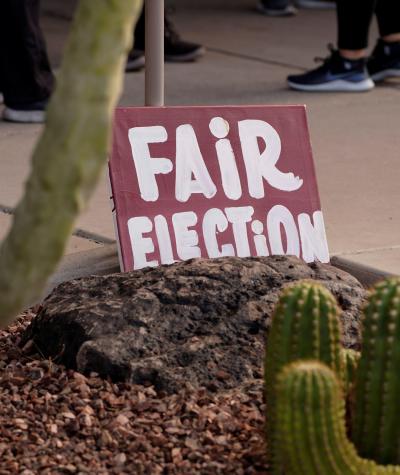Arizona voters are ushering in a new era of campaign finance transparency in the Grand Canyon State. Specifically, an overwhelming majority of Arizona voters passed Proposition 211 on Election Day 2022, also known as the “Voters’ Right to Know Act.”
Prop 211 will shine light on the original sources of secret campaign spending in Arizona and ensure voters know who is spending big money to influence their ballots.
The measure's success comes from years of committed effort by Stop Dark Money, including former Arizona Attorney General Terry Goddard, alongside grassroots activists and other former elected officials. With the passage of Proposition 211, Arizona stands as a model for other states looking to stop secret spending in their elections.
The Supreme Court’s 2011 decision in Citizens United opened the floodgates for secret spending (often referred to as “dark money”) in our elections, allowing unlimited corporate spending and ultimately leading to widespread use of super PACs – political committees that do not give money directly to a candidate and, as a result, are allowed to accept and spend unlimited amounts of money to influence our elections.
Outside spending in elections has soared since the Citizens United decision, especially in states like Arizona. While campaign finance laws generally require candidates and other political committees to disclose their donors, wealthy special interests have exploited gaps in existing campaign finance laws to secretly spend huge sums of money to influence elections.
By funneling big money through intermediaries that are rarely required to disclose information about where their money came from, such as 501(c)(4) nonprofit organizations, these wealthy special interests are able to hide their role in attempting to influence voters at the polls. Indeed, as CLC noted in its report published last year, Arizona’s existing campaign finance disclosure system has been described as “one of the most pro-dark-money statutes imaginable.”
Proposition 211 is a straightforward solution to this problem in Arizona. The Supreme Court has repeatedly recognized that campaign finance disclosure laws serve a critical role in creating an informed electorate, and Proposition 211 will restore integrity to disclosure requirements by ensuring that the true sources of the funds being spent are disclosed.
Any group who spends more than $50,000 in statewide campaigns (or $25,000 on other campaigns) on political media advertising and related spending in Arizona will be required to keep track of the large donations it receives and to disclose the original sources of donations of more than $5,000, including information about persons who act as intermediaries between the original sources of the money and the spender.
Importantly, Proposition 211 also empowers donors who do not want their money used for political spending.
Any person or group that is required to report the additional information required by Proposition 211 must provide a donor notice that the donor’s money may be used for political spending in Arizona and the opportunity for the donor to opt out of having their donation used for that purpose. If the donor opts out, their money is not used for political spending and, as a result, the donor is not identified in in the reports required by Proposition 211.
By requiring big election spenders to disclose the original sources of their funds, Proposition 211 safeguards the First Amendment right of Arizona voters to fully participate in the political process by knowing who is truly funding the messages seeking to sway their decisions at the ballot box.
CLC has reviewed Proposition 211 and concluded that the measure is plainly constitutional. As detailed in a white paper published by CLC, Proposition 211 is consistent with the First Amendment right to democratic self-government and with Supreme Court precedent upholding campaign finance disclosure laws.
Arizona voters have turned on the lights, and there is no longer a place to hide dark money in Arizona elections. Other cities and states should follow Arizona’s lead and enact laws that make real voters’ right to know who is spending big money to influence their vote.

